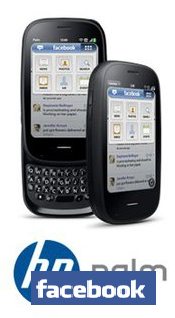Could Facebook really make HP's webOS work?

HP is trying to sell its webOS and Facebook may be one of the few viable buyers, according to one analyst. The bigger question is whether Facebook can take a slick mobile operating system and make a big mobile move.

Mobile media is integrated. Google has Android in a vertical stack that now includes hardware via the Motorola Mobility acquisition. Apple has its iOS integration with the iPhone. Microsoft and Nokia are connected at the hip. And RIM has its integrated hardware and software mobile stack. If Facebook is going to be a player it needs to integrate its social services with an OS.
Mobile is gaining share. IDC reports that mobile Internet usage is eclipsing wired access.
Developers and carriers want another smartphone ecosystem. Facebook could bring a lot of developers to the party.
Misek's bottom line:
HP has stated that they are attempting to sell WebOS (the former Palm operating system). Based on our analysis of prospective buyers and our checks, we believe Facebook is the best fit. We see this scenario as most negative to RIM and Windows 8 as there would be another major competitor vying to be the third mobile OS.
Misek arrives at his conclusion by ruling other parties out. Most smartphone makers seem to be gravitating to Android and Microsoft's Windows Phone 7. Others have their own OS and wouldn't need webOS. Misek added:
Due to Facebook's scale, developer community, and movement toward media (e.g., music) and communications (Messenger), it is possible that an acquisition of an OS asset like this could be a good option. Checks with developers indicate that they would support a potential Facebook OS, and industry sources have noted Facebook's historic interest in a mobile OS or heavily influencing one.
On paper, Misek's argument makes some sense. However, Facebook and the webOS wouldn't be a slam dunk. Among the headaches the webOS would bring to Facebook.
- Facebook would have to align carriers;
- It would have to design hardware---or at least manage outsourced options;
- Facebook would have to certify devices on wireless networks;
- And Facebook would have to integrate the social graph with an OS that has potential, but couldn't gain traction under its two previous owners (Palm, HP).
Of course, Facebook could buy the webOS and form some venture to create a Facebook phone, but it still takes management time. ZDNet's Emil Protalinski disagreed with Misek's take and has argued that Facebook could be better off developing its own mobile OS.
In other words, webOS could be a huge distraction to Facebook at a time where it is under fire from Google and its Google+ social network. The good news for Facebook is that it appears to managing Google well, but that doesn't necessarily mean it needs to run out and buy webOS and bail HP out.